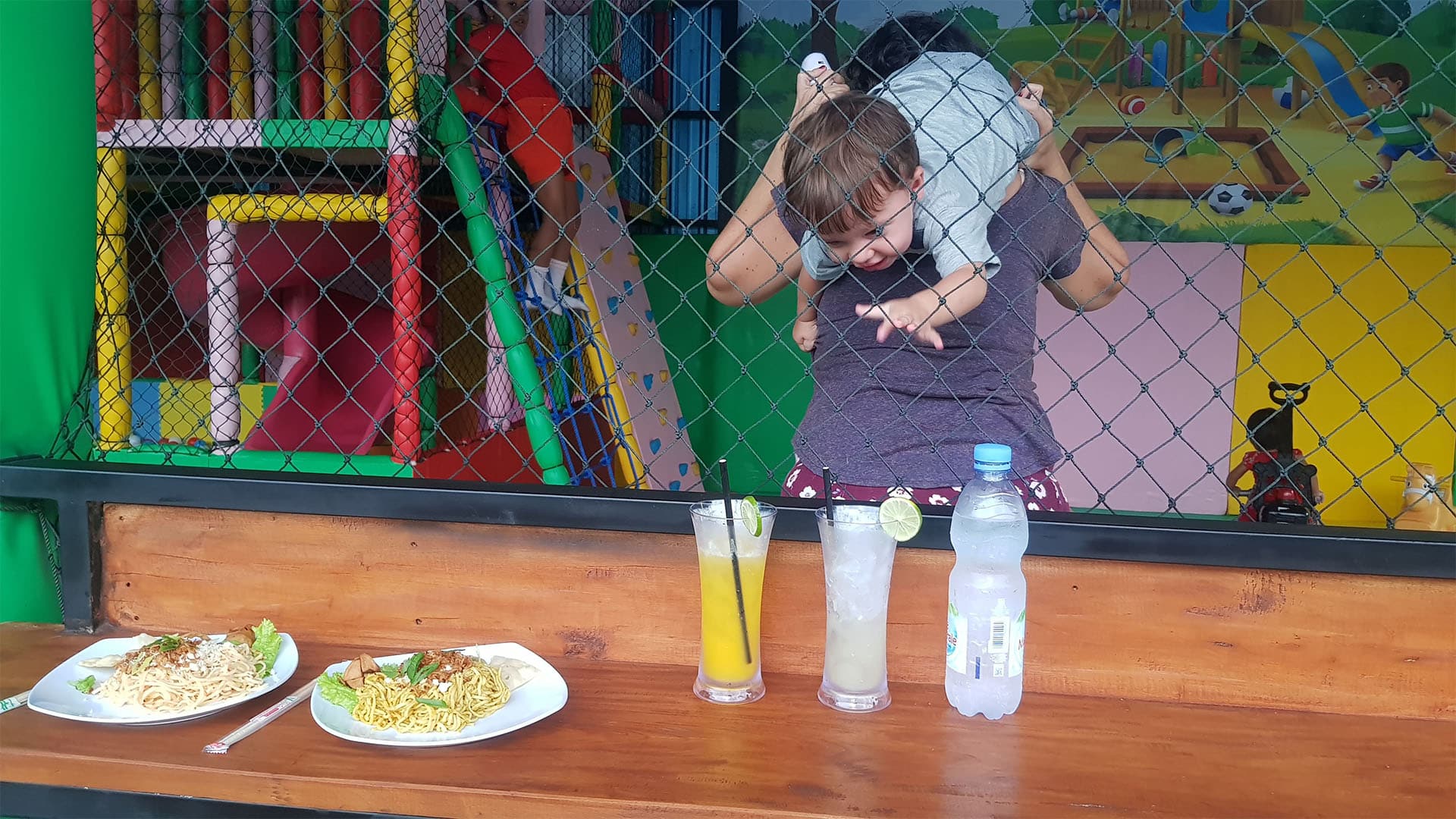What Is Bali Belly? Understanding the Causes and Treatments
Bali Belly is a term commonly used to describe a range of gastrointestinal symptoms experienced by travellers in Bali and other regions in Indonesia. These symptoms often include stomach cramps, nausea, vomiting, and diarrhoea. The condition is typically caused by consuming contaminated food or water or handling cash, and it is a common concern for tourists visiting the area who are not accustomed to the local bacterial flora.
The risk of experiencing Bali Belly can be minimised through precautions such as drinking bottled or purified water, eating thoroughly cooked food, and avoiding raw fruits and vegetables that have not been peeled or prepared hygienically. Personal hygiene, particularly regular handwashing before eating, is also an effective measure to prevent the ingestion of harmful microbes.
Medical professionals advise that if you do encounter Bali Belly, staying hydrated is critical, considering that diarrhoea and vomiting can lead to significant fluid loss. Over-the-counter medications can alleviate symptoms, but seeking medical attention is advised if symptoms persist or worsen. It is also suggested to avoid anti-diarrhoeal medications initially as they can prolong the presence of harmful organisms in the gut.
Understanding Bali Belly
Bali Belly refers to a common gastrointestinal disorder affecting travellers in Indonesia, particularly on the island of Bali. This condition often results from consuming contaminated food or tap water.
Causes of Bali Belly
The primary cause of Bali Belly is ingestion of food or water that has been contaminated with bacteria, viruses, or parasites. Risk factors include:
- Contaminated Food: Eating at places with poor hygiene practices.
- Tap Water: Drinking or using tap water for brushing teeth.
- It is advised to avoid raw foods, street foods, and to always drink bottled or purified water.
Symptoms of Bali Belly
People with Bali Belly may experience a range of symptoms. The most common include:
- Diarrhoea
- Stomach cramps
- Nausea and vomiting
- Fever
The duration of these symptoms can last from a few days to a week.
Diagnosis of Bali Belly
To diagnose Bali Belly, doctors will typically:
- Review the individual’s medical history and symptoms.
- Conduct a physical examination.
- Recommend tests, such as stool analysis, to identify the presence of harmful organisms.
Health Risks and Complications
Travellers experiencing Bali belly can face significant health risks and complications if symptoms are not managed effectively.
Dehydration and Electrolyte Imbalance
Dehydration occurs when the body loses more fluids than it takes in, and is a common issue associated with diarrhoeal diseases like Bali belly. Symptoms of dehydration include:
- Thirst
- Dry mouth
- Decreased urine output
- Fatigue
- Dizziness
To prevent dehydration, individuals are advised to remain well-hydrated by consuming clear fluids like water, oral rehydration solutions, or liquids containing essential minerals and salt.
Electrolyte imbalance arises when the levels of electrolytes in your body are either too high or too low. Electrolytes, such as sodium, potassium, and chloride, are crucial for maintaining nerve and muscle function as well as hydration levels. An imbalance can manifest through symptoms like:
- Muscle cramps
- Weakness
- Confusion
- Irregular heartbeat
Travellers need to replenish their electrolytes when experiencing severe diarrhoea and vomiting.
Chronic Digestive Issues
In some cases, Bali belly can lead to ongoing digestive problems, even after the initial infection has cleared. This may weaken the immunity of the affected individual and worsen overall health. Persistent symptoms might include:
- Abdominal pain
- Bloating
- Irregular bowel movements
To combat these issues, seeking medical advice is recommended. Patients may need a tailored treatment plan, which could include dietary changes and specific medications. Addressing chronic symptoms promptly helps to reduce the risk of more serious health complications.
Preventive Measures
Awareness and consistent application of safe practices can significantly reduce the risk of contracting Bali Belly.
Food and Water Safety
When visiting Bali, individuals should be cautious about their food and water intake. Here are some specific recommendations:
- Bottled Water: Always opt for sealed bottled water instead of tap water. Even when brushing teeth, it is advisable to use bottled water to avoid any potential contamination.
- Avoid Ice: Ice may be made from tap water, so it’s best to decline it in drinks.
- Hot Foods: Consume foods that are freshly cooked and served hot, as the cooking process helps eliminate harmful microbes.
- Peelable Fruits: Choose fruits that can be peeled, so the inside remains uncontaminated by any untreated water or bacteria.
Personal Hygiene Practices
Personal hygiene plays a vital role in preventing a range of travel-related illnesses, including Bali Belly.
- Regular Hand Washing: Diligent hand washing with soap and clean, safe water before eating and after using the bathroom is essential to reduce the risk of contagion.
- Sanitiser: Carry alcohol-based hand sanitiser for situations where soap and water may not be readily available, ensuring hands are kept clean, especially before meals.
By taking these proactive steps and exercising proper hygiene, the likelihood of contracting Bali Belly can be greatly minimised.
Treatment Strategies
When experiencing Bali Belly, patients can consider several forms of treatment to alleviate their symptoms. These include specific medications and dietary modifications to manage discomfort and hasten recovery.
Medication and Remedies
Antidiarrheal medications such as loperamide (often known by the brand name Imodium) can help reduce the frequency of bowel movements and provide short-term relief. In some cases, a doctor may prescribe antibiotics if a bacterial infection is suspected. Additionally, over-the-counter remedies such as bismuth subsalicylate can help relieve mild diarrhoea and nausea.
- Antibiotics: May be prescribed for severe cases.
- Loperamide: Provides temporary relief from diarrhoea.
- Bismuth Subsalicylate: Can reduce diarrhoea and queasiness.
Hydration and Diet
Maintaining proper hydration is essential, as diarrhoea can lead to significant fluid loss. Patients should drink plenty of clear fluids, such as water, and consider using rehydration drinks containing a mix of salts and glucose to restore electrolyte balance.
- Clear Fluids: Water is essential for rehydration.
- Rehydration Drinks: Help replenish electrolytes and fluids.
Diet plays a critical role in recovery. Eating a bland diet consisting of simple foods like bananas, rice, applesauce, and toast (famously known as the BRAT diet) can aid in normalising digestion.
- Bland Diet: Consists of simple, stomach-friendly foods.
- BRAT Diet: Bananas, Rice, Applesauce, Toast.
Traveller Advice
This segment provides key information to help tourists recognise the difference between common traveller’s diarrhoea and Bali Belly, and understand when it is necessary to seek medical attention.
When to Seek Medical Attention
Tourists should seek medical attention for Bali Belly if they experience symptoms such as severe dehydration, blood in stools, or high fever. Medical advice is crucial if symptoms persist for more than a few days or exacerbate. Here is a concise list of indicators that warrant immediate medical attention:
- Persistent symptoms beyond 48 hours
- Dehydration signs: infrequent urination, dry mouth, lethargy
- Stools containing blood or pus
- High fever over 38°C
- Continuous vomiting preventing fluid intake
Traveller’s Diarrhoea vs. Bali Belly
Traveller’s diarrhoea and Bali Belly often share symptoms but have different implications. Traveller’s diarrhoea:
- Typically refers to a mild, self-limiting condition
- Affects travellers globally
- Usual cause: ingestion of contaminated food or water
Bali Belly, specifically:
- Is more severe and can lead to complications if untreated
- Affects travellers in Bali, Indonesia
- Often linked to bacterial infections like E. coli or Salmonella
Recognising the distinction can aid travellers in responding appropriately to their symptoms and seeking help when necessary.
Living with Bali Belly
Bali Belly can significantly disrupt daily activities, but with appropriate management, individuals can alleviate symptoms and consider long-term health implications.
Managing Symptoms at Home
- Rest: Ensuring adequate rest is essential for recovery, as the body needs energy to fight the infection causing the upset stomach.
- Hydration: Drink plenty of fluids to prevent dehydration, opting for bottled or boiled water and oral rehydration solutions if necessary.
- Diet: Eat bland, easy-to-digest foods such as toast, rice, or bananas to minimise further irritation to the stomach.
Long-Term Health Considerations
- Medical Advice: Seek medical advice if symptoms persist or worsen, as chronic gastrointestinal issues may require additional treatment.
- Health Maintenance: Once recovered, maintain a healthy diet and consider probiotics to restore gut health and prevent future occurrences.
Culinary Precautions in Bali
To avoid the discomfort of Bali Belly, travellers should observe certain eating habits and choose where they dine with care.
Safe Eating Practices
Tourists are advised to be vigilant with what they consume. Ice in drinks can often be a source of contamination, so it’s wise to request beverages without it. Similarly, while fruits and salads might seem like healthier choices, they should be eaten with caution as they are often washed with local water, which can lead to stomach cramps.
Eating thoroughly cooked rice, fish, and other seafood dishes instead of raw preparations reduces the risk of food poisoning. Inspecting plates and cutlery for cleanliness can also prevent gastrointestinal issues.
Choosing the Right Establishments
Selecting where to eat is as important as choosing what to eat. It is generally safer to frequent dining spots with a high turnover of customers, which suggests fresh ingredients are regularly used.
Here is a list of considerations for finding suitable establishments:
- High Hygiene Standards: Choose restaurants that appear clean and well-maintained.
- Reputation: Look for places that come recommended by locals or have positive reviews.
- Kitchen Visibility: Visible kitchens allow for a quick assessment of food-handling practices.
- Street Vendors: Exercise discretion when purchasing from street vendors; opt for those where you can see food cooked at high temperatures.
- Sourcing of Seafood: Inquire where seafood is sourced from. Fresh local seafood is typically a good choice, but items that have been pre-frozen or imported might be less reliable.
Bali Belly FAQs
What is Bali Belly?
Bali Belly refers to gastrointestinal discomfort that travellers often experience when visiting Bali. It typically includes symptoms like diarrhoea, stomach cramps, and nausea.
How do you get Bali Belly?
It is commonly caused by consuming contaminated food or water or handling cash. Factors such as exposure to new types of bacteria, eating in unhygienic conditions, and consuming raw or undercooked foods can increase the risk.
Is Bali Belly contagious?
Bali Belly is not usually considered contagious in the sense of being spread from person to person. However, the pathogens causing the illness can be transferred if hygiene practices are not followed.
What are the symptoms of Bali Belly?
Symptoms often include watery stools, abdominal cramps, nausea, sometimes vomiting, and fever. It can also lead to dehydration if not managed properly.
How do I avoid Bali Belly?
- Be cautious with food and water: Only drink bottled or purified water.
- Practice good hygiene: Wash hands thoroughly before eating.
- Eat wisely: Eat at reputable establishments and avoid raw food.
What is Rangoon Runs?
‘Rangoon Runs’ is another name for traveller’s diarrhoea, similar to Bali Belly, which is experienced in regions like Rangoon.
How can you treat Bali Belly?
- Stay hydrated: Drink plenty of fluids to prevent dehydration.
- Rest: Ensure adequate rest to aid recovery.
- Medication: Over-the-counter anti-diarrhoeal medications may help manage symptoms. If symptoms persist, seek medical advice.


